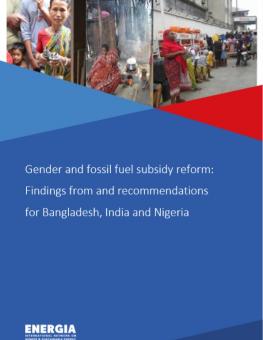
Gender and Fossil Fuel Subsidy Reform: Findings from and recommendations for Bangladesh, India and Nigeria
This report looks at the impact of subsidies to kerosene and liquefied petroleum gas (LPG) and subsidy reform from a gender perspective across three countries: Bangladesh, India and Nigeria.
This report looks at the impact of subsidies to kerosene and liquefied petroleum gas (LPG) and subsidy reform from a gender perspective across three countries: Bangladesh, India and Nigeria.
The research is based around two overall research questions:
- How do existing kerosene and LPG subsidy policies affect the welfare, productivity and empowerment of women and girls in low-income households?
- How might the welfare, productivity and empowerment of women and girls in low-income households change as a result of specific, nationally relevant proposals for the reform of existing kerosene and LPG subsidies?
These questions were explored using secondary data, household surveys across the three countries reaching over 2,400 households and focus group discussions. The questions were answered within the context of hypotheses made during the scoping phase and literature review for the research, based on a review of 28 reform episodes. This research attempted to answer the above questions in relation to an income effect, an energy use effect and an energy supply effect, all from a gender perspective
You might also be interested in
G20 Finance Ministerials and World Bank/IMF Spring Meetings: Expert comment
G20 finance ministerials and World Bank/IMF spring meetings will take place this week in Washington. High on the agenda is the need to mobilize trillions of dollars of investment in the transition to clean energy.
IISD Applauds Canada’s Reaffirmation to End Domestic Public Finance for Fossil Fuels in Budget 2024
Today's federal budget announcement delivers new measures to support affordability and reaffirms Canada’s commitments on climate action.
South African Fossil Fuel Subsidies Hit Record Highs as Country's Energy Crisis Deepens
South Africa's fossil fuel subsidies tripled between 2018 and 2023, hitting USD 7.5 billion, up from USD 2.9 billion 5 years earlier, a new report by IISD reveals.
Blackouts and Backsliding: Energy subsidies in South Africa 2023
Blackouts and Backsliding presents the latest energy subsidy data for South Africa.